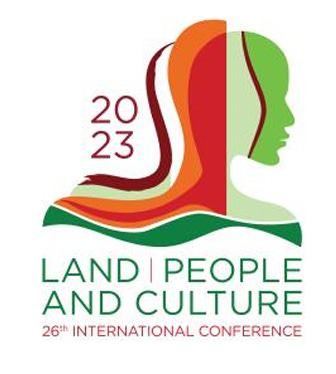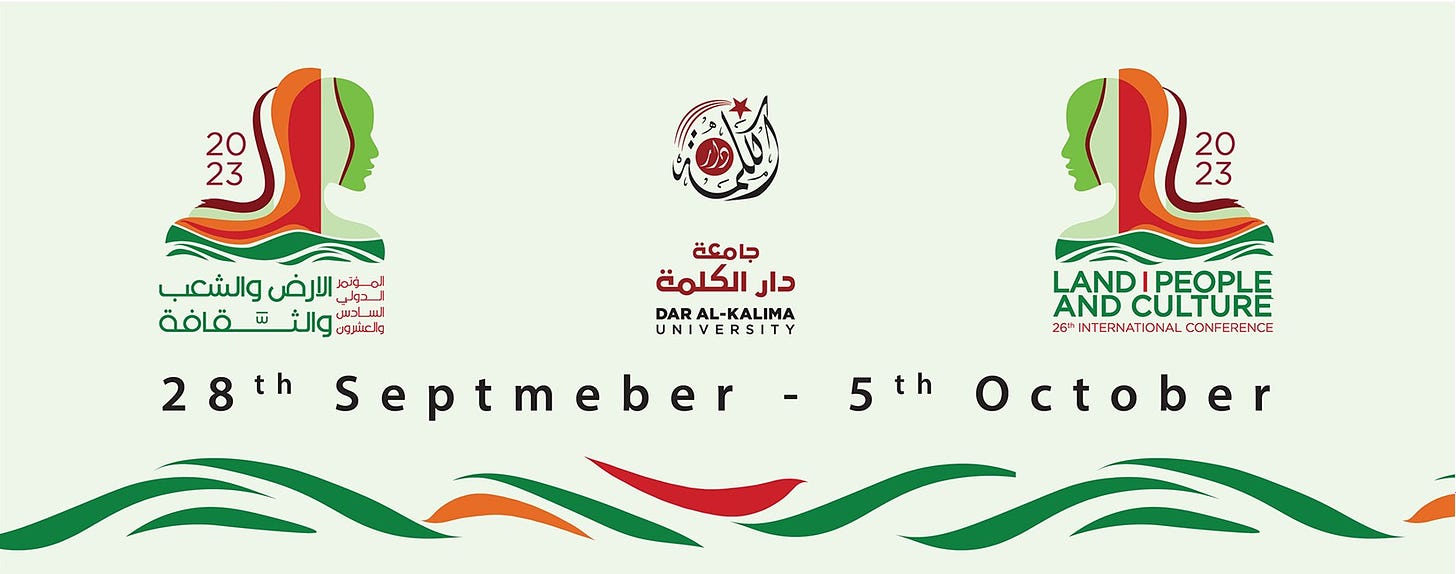Land, People and Culture Conference
I am so excited to be traveling to Bethlehem, Palestine to present a paper, "Postcolonialism, Hybridity and Resistance: Working Towards a Hybrid Theology" at Dar al-Kalima University's Conference, "Land, People and Culture".
Land, People and Culture is the 26th International Conference at Dar al-Kalima University, Bethlehem, Palestine (September 28 - October 5, 2023).
Following its academic and contextual traditions, Dar al-Kalima University is holding an international conference during September and October of 2023, under the theme of land, people and culture. The conference will have a particular focus on the Palestinian question, as 2023 marks the 75th remembrance of the Nakba, the catastrophe in which hundreds of Palestinian villages were destroyed and hundreds of thousands of Palestinians were forced to flee their homes and have been denied the right of return since.
This conference is part of the university’s established commitment toward assessing various aspects of culture, identity, and art. As the only university in Palestine specialized in art and culture, Dar al-Kalima University has launched numerous undergraduate and graduate academic programs, as well as a wide range of professional diplomas, in order to further develop understanding and engagement with cultural and artistic industries, research, and publishing. These efforts act as part of its contribution to the global discussion on formation of identities and effective communication within various cultural experiences internationally. Dar al-Kalima University’s conference aims to provide a forum in Palestine for the sharing of such research and the promotion of scholarly debate, interaction, and dialogue among Palestinian researchers and participants from around the world. The inclusion of scholars and participants from places such as Europe, United States of America, Latin America, Africa, and Asia will bring an international scope and diverse perspectives to the event, fostering an essential, interdisciplinary, multi-ethnic and multi-cultural environment.
My Abstract:
Postcolonialism, Hybridity and Resistance
Colonialism has had devastating consequences on people around the globe as it has created alienation, dislocation, exile, and subordination for the colonized. Due to colonialism, globalization, and migration, many are living in other places than their birth places which is beyond their own control and desires. Colonialism negatively affects one’s understanding of self and community due to the colonizer’s role in destruction and domination. In many instances, religion has played a major role in colonialism around the world. Religions tend to make distinctions between ‘us’ and ‘them’. These distinctions usually embed a value judgment, such as Christians versus pagans, where the non-privileged class is viewed as impure, unworthy, and somehow less human. Christianity and other religions intentionally or unintentionally build walls to divide individuals and groups of people. The division of people into categories due to religious heritage, background, and belief appears throughout religious histories.
North America has been religious from its beginnings, with Indigenous people’s spirituality and practice. Christianity has been part of the North American religious landscape since the beginning of immigration from Europe. The USA and Canada were built by dispossessing the Indigenous peoples, often violently. Many Native Americans were either murdered or killed by diseases brought by white European settlers. As a result, 98% of the population was wiped out and their stories were lost with them. This was an intentional action arising from the Doctrine of Discovery, promulgated by Pope Alexander VI on 4 May 1493 to provide justification for the Spanish to conquer the New World. The Doctrine of Discovery ensured Spanish rights to the lands discovered by Columbus in 1492. It provided a spiritual, political, and legal justification for colonization and seizure of land not inhabited by Christians. It gave a framework for Christian explorers to claim land in territories uninhabited by Christians. If a land did not have a Christian occupant, it was defined as ‘discovered’ and was claimed.
Dispossessed on their own stolen land, how can Native Americans survive, resist, and thrive. The Native Americans have sought justice for stolen land, stolen culture, and history to much resistance by the settlers. Religions must intervene and play a role in active resistance and rebuilding of peoples. As religions adjust to make sense of the historical past of colonialism, new ways of thinking, believing and acting need to be implemented into Christianity. This paper will explore new biblical readings and Christological understandings to help recover and restore from the devastations from colonialism. Christianity needs to find liberative ways and meaning to work towards an equitable way of living out Christianity in a postcolonial world.
Dr. Mitri Raheb who is the President of Dar al-Kalima University was a guest on Madang Podcast. You can listen to him here:
Special Events:
1. I will be at Homebrewed Christianity’s Theology Beer Camp. Please join me and use discount code “madanggodpod” to get 25.00 off registration.
2.Join GreenFaith & partners for multifaith participation in the March to End Fossil Fuels on Sunday, September 17, in New York City. To learn more, visit endfossilfuels.us or email aly@greenfaith.org.





